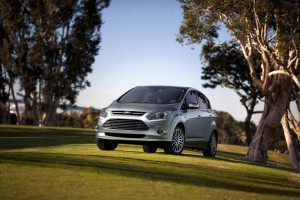
New California rules would put millions of plug-ins, like this Ford C-Max Energi, battery and hydrogen cars on the state's roads by 2025.
California’s environmental regulators have announced plans to tighten already strict emissions rules that were previously aimed at putting at least 1.4 million plug-in hybrids and battery cars on the state’s roads by 2025 – a move that could add millions more “clean cars” to the total.
Though industry officials have expressed concerns for the technical and cost implications, a wide range of companies, including General Motors, Ford, Chrysler and Nissan, told the California Air Resources Board, or CARB, that they’ll support the latest mandates.
The new rules would require that by 2025 at least one of every seven vehicles sold in California would have to be a plug-in hybrid, extended-range electric vehicle or pure battery-electric vehicle, or BEV.
“We can’t afford to wait. We have to act on these issues now,” said CARB Chairman Mary Nichols during hearings on the proposed new rules. “Our projections show continued growth in population and vehicle miles traveled, which will affect air quality for years to come.”
CARB has routinely set some of the nation’s toughest emissions standards using a clause in federal law that allows the Golden State to exceed the mandates for the rest of the country. Other states are allowed to adopt the tougher California rules – as many already have – so what happens with the new rules could have a far broader reach, even with California already the nation’s single-largest automotive market.
The new mandates, said Nichols, should set an example for “the nation and the world.”
Ultimately, CARB’s goals are even more ambitious than the 2025 target. The environmental body eventually wants to have 87% of the vehicles in California powered by batteries, hydrogen or some other form of clean energy.
Some of the details of the CARB proposals were challenged by the industry, but the general support of manufacturers like GM – which had long been faulted by environmentalists for resisting clean car technology – shows a dramatic shift towards cooperation between industry and government in an area where the public clearly wants action, according to most surveys.
But not everyone was in the pro camp.
“Consumers do not make purchasing decisions based upon regulatory mandates,” warned Jonathan Morrison, representing California’s powerful auto dealers’ association.
Other critics have warned that the potential price tag – which some studies have pegged at close to $10,000 a vehicle – would slash annual car sales, costing tens, even hundreds of thousands of jobs.
The Air Resources Board downplayed such concerns, however, citing other research – such as a study by the Boston Consulting Group – that estimate the targeted mandates could be achieved for less than $2,000 a vehicle.
The phased-in mandate “is planned for a 40-year horizon” that will make it easier to achieve, stressed CARB spokesman David Clegem, providing “time to put the pieces in place with no surprises.”
